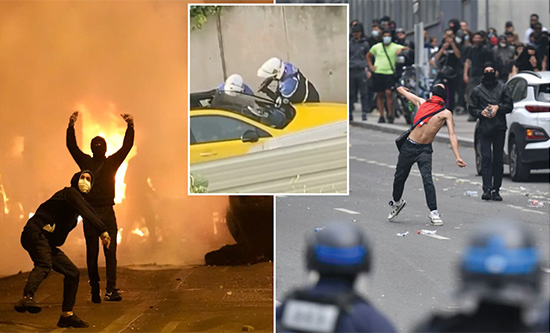
On 27 June, a French policeman shot dead Nahel Merzouk, a 17-year-old of Algerian descent, in Nanterre, west of Paris. The police claimed they had exercised ‘legitimate self-defence’ after Nahel refused to comply with a traffic stop. They also lied when they claimed he had a criminal record and was a ‘dangerous individual’. But video footage of events and testimonies from other witnesses told a completely different story, one that showed, instead, an excessive use of police force. The police inspectorate has reported that one of the two police officers clearly menaced Nahel before he was shot, saying: ‘You’re gonna take a bullet in the head’, despite Nahel posing no immediate threat.
The tragedy ignited the anger of the youth of the banlieues and cités of France (neighbourhoods usually in the suburbs of larger cities, composed mostly of large housing estates). On the night of Nahel’s death, an uprising erupted in Nanterre. In the days following, the anger spread to other large urban centres across the country. In a video published on 28 June, Nahel’s mother Mounia called for ‘a revolt for her son’, before later changing her tone under pressure from the media. While short-lived, the events were of an intensity that terrified the ruling class. Rather than being confined to the banlieues, the protests took place in city centres, forcing the French bourgeoisie to pay attention. Protesters used guerilla-like tactics, operating in small groups, and striking spontaneously, starting fires and destroying private property.
The government narrative, willingly adopted by the mass media, is that Nahel’s death is a ‘tragedy’, an exceptional occurrence, perpetrated by a ‘bad cop’, but that the response to it by French working class youth is unacceptable. It attempts to portray the participants in the uprisings as exploiting Nahel’s death to further their own violent and criminal agendas. This narrative seeks to deny that the protests are political and instead attacks those who have risen up in justifiable anger. President Emmanuel Macron responded to the protests by announcing further security measures and even heavier policing, blaming parents not controlling their children for the nights of violent protest.
The reality is that while the riots were driven by immediate anger of the murder of Nahel, their wider political character is undeniable. Years of racist policing and oppression of the marginalised communities of the banlieues fuelled that anger and made this not just a protest about one racist cop but about the whole system.
It is due to the pressure caused by the protests that the policeman has been charged with voluntary homicide and is currently detained. Initially there was no criminal investigation at all. On 30 June, the largest police unions in France, Alliance and UNSA Police, issued a vitriolic press statement declaring war against the rioters, describing them as vermin and ‘savage hordes’. In it they announced their intention to impose order using any means necessary. The police’s declaration of war has inevitably fuelled an overtly racist and fascist response. Jean Messiha, a far-right media personality, set up a Gofundme page for the family of the policeman responsible for Nahel’s death, which collected over €1.5m in a matter of days before being shut down. Far-right groups gathered in their hundreds in cities such as Lyon, to ‘protect their country’ and attack rioters.
A racist police force
The government denies that the French police are institutionally racist. However, France is an imperialist power, and the historic role of the French police is intricately connected to policing and subjugating the subjects of France’s colonial empire, both abroad and at home.
During the Algerian War of Independence (1954-1962), the French police committed multiple atrocities against Algerian immigrants and their descendants. The massacre of 17 October 1961 is one of the most deadly examples. The French federation of the Algerian National Liberation Front had defied a curfew imposed only on Algerians to organise a peaceful protest in Paris. Unarmed protesters were violently attacked by police. Up to 200 people died as a result of police brutality, many of them drowned in the River Seine. Less than a year later, on 8 February 1962, nine more people died at the hands of the police after a protest against the Organisation de L’armée Secrète, or OAS, a far-right terrorist group created to protect French Algeria.
The same racist policing meted out to those protesting against colonial occupation has continued against the descendants of people from the former French colonies, who are disproportionately concentrated in the banlieues. On 27 October 2005, riots erupted after two teenagers, Zyed Benna and Bouna Traoré, died in Clichy-sous-Bois in eastern Paris while fleeing from the police. The two boys were electrocuted after taking refuge in an electrical transformer station. Protests lasted for three weeks and ended only when the government used laws from the time of the Algerian War to declare a national state of emergency. This empowered local governments to impose curfews and other exceptional security measures. In 2015, after a decade of campaigning, two police officers were tried for ‘failing to assist persons in danger’ in relation to the boys’ deaths. Both were acquitted.
The number of police killings per year has increased since 2017, when a law was passed which broadened the use of firearms by police officers. Working class people of colour are routinely harassed and killed by the police. In 2022, French police shot dead 13 people during traffic stops. Since the start of this year alone, 17 people have been killed at the hands of the police. Systematically, the police force has protected and defended ‘bad cops’. It is an arm of the imperialist state and exists solely to defend the property of the ruling class, not to protect citizens.
Solidarity with the oppressed fighting back against racist police!
Sarah Guebre-Egziabher




